International Law Perspectives on Ransom: A Detailed Analysis
VerifiedAdded on 2023/06/15
|14
|4036
|115
Essay
AI Summary
This essay provides an overview of the concept of ransom within the framework of international law. It begins by defining ransom and international law, then delves into historical perspectives, including those from Islam and Christianity. The essay discusses ransom in the context of criminal activities like kidnapping and hostage-taking, examining ransom money, ransom as exchange, and ransom as concession. It also addresses the challenges of ransom payments in dealing with terrorist groups and the non-concession policies of countries like the US and UK. Finally, the essay references international instruments like the Hostages Convention and the Terrorism Financing Convention, highlighting the complexities and preventive measures associated with ransom situations under international law. Desklib is a platform where students can find more solved assignments and study tools.
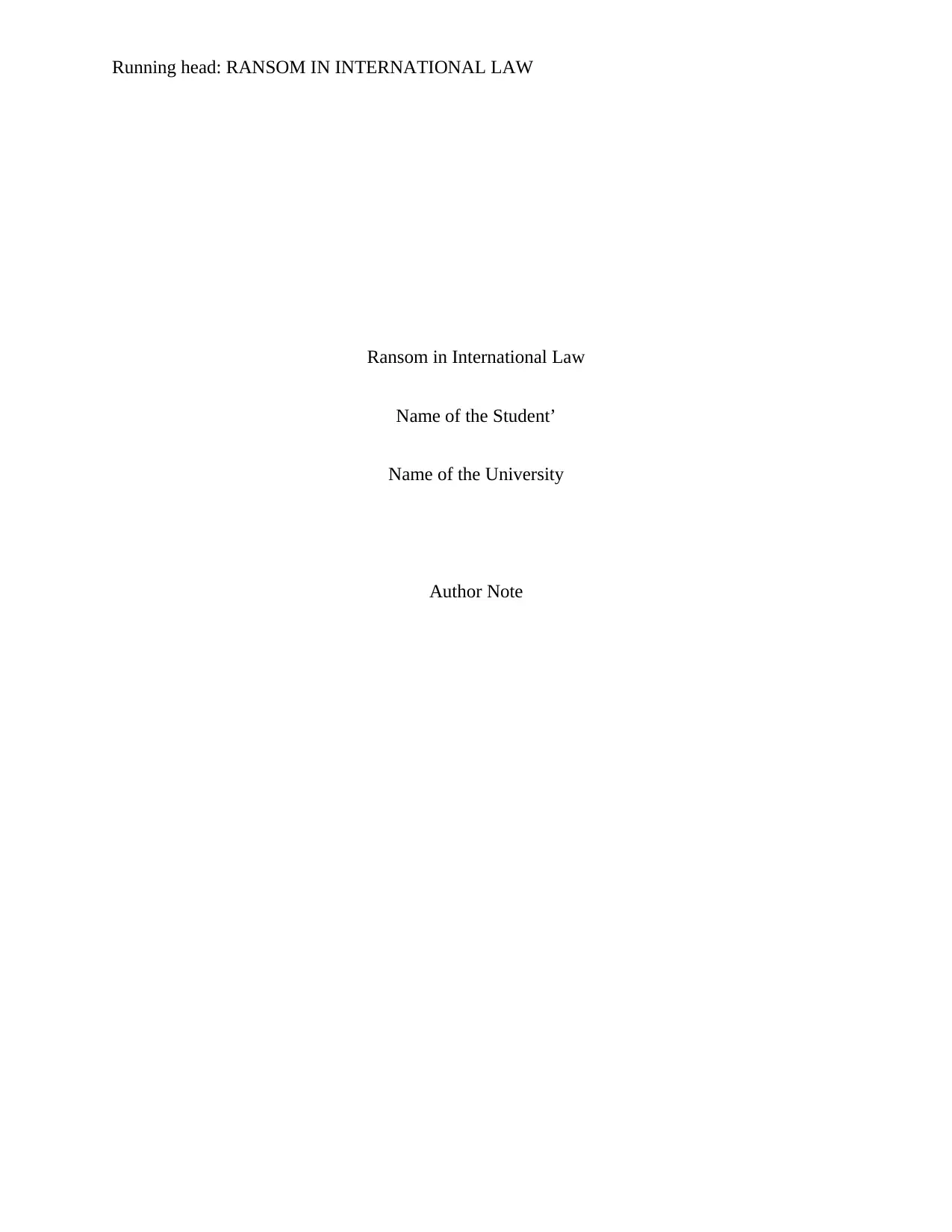
Running head: RANSOM IN INTERNATIONAL LAW
Ransom in International Law
Name of the Student’
Name of the University
Author Note
Ransom in International Law
Name of the Student’
Name of the University
Author Note
Paraphrase This Document
Need a fresh take? Get an instant paraphrase of this document with our AI Paraphraser
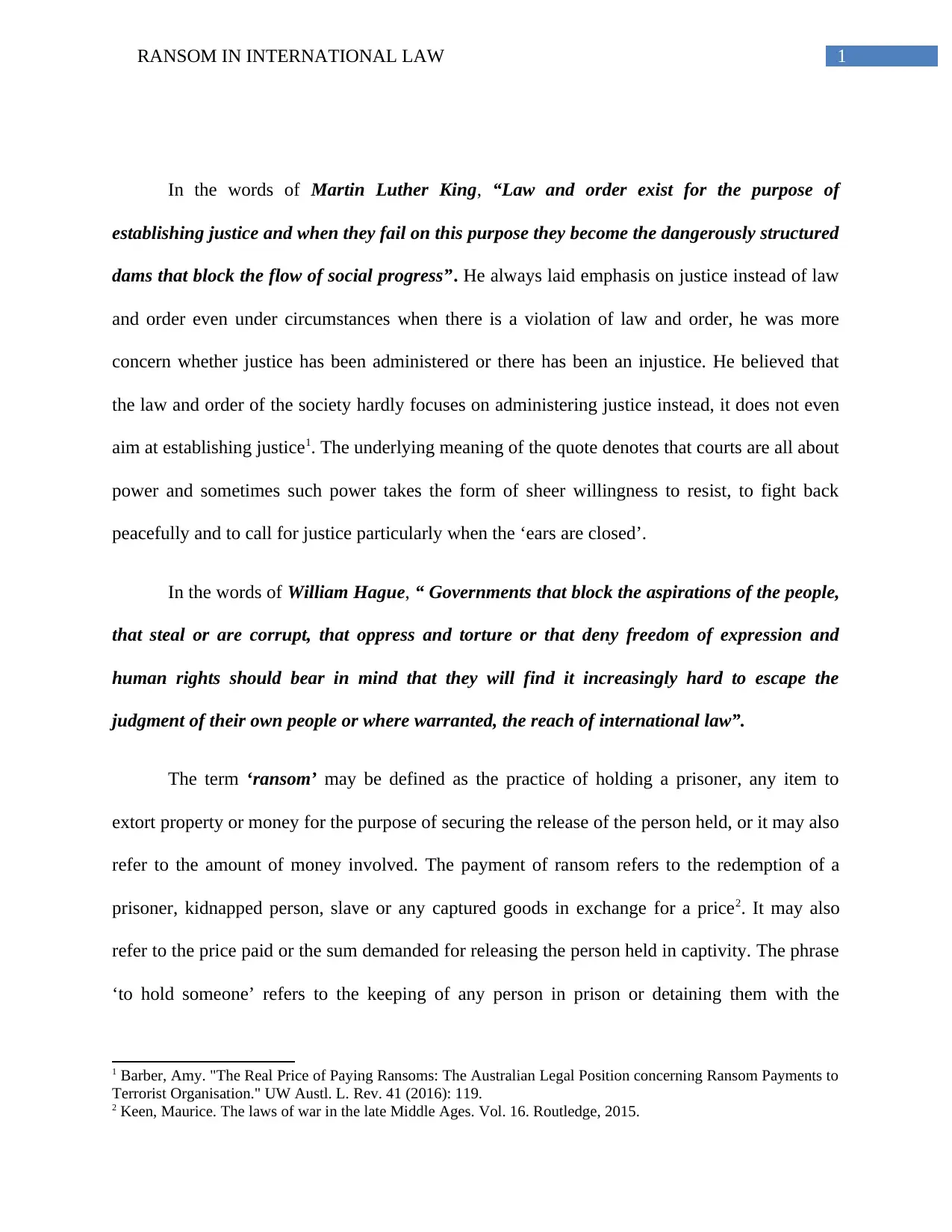
1RANSOM IN INTERNATIONAL LAW
In the words of Martin Luther King, “Law and order exist for the purpose of
establishing justice and when they fail on this purpose they become the dangerously structured
dams that block the flow of social progress”. He always laid emphasis on justice instead of law
and order even under circumstances when there is a violation of law and order, he was more
concern whether justice has been administered or there has been an injustice. He believed that
the law and order of the society hardly focuses on administering justice instead, it does not even
aim at establishing justice1. The underlying meaning of the quote denotes that courts are all about
power and sometimes such power takes the form of sheer willingness to resist, to fight back
peacefully and to call for justice particularly when the ‘ears are closed’.
In the words of William Hague, “ Governments that block the aspirations of the people,
that steal or are corrupt, that oppress and torture or that deny freedom of expression and
human rights should bear in mind that they will find it increasingly hard to escape the
judgment of their own people or where warranted, the reach of international law”.
The term ‘ransom’ may be defined as the practice of holding a prisoner, any item to
extort property or money for the purpose of securing the release of the person held, or it may also
refer to the amount of money involved. The payment of ransom refers to the redemption of a
prisoner, kidnapped person, slave or any captured goods in exchange for a price2. It may also
refer to the price paid or the sum demanded for releasing the person held in captivity. The phrase
‘to hold someone’ refers to the keeping of any person in prison or detaining them with the
1 Barber, Amy. "The Real Price of Paying Ransoms: The Australian Legal Position concerning Ransom Payments to
Terrorist Organisation." UW Austl. L. Rev. 41 (2016): 119.
2 Keen, Maurice. The laws of war in the late Middle Ages. Vol. 16. Routledge, 2015.
In the words of Martin Luther King, “Law and order exist for the purpose of
establishing justice and when they fail on this purpose they become the dangerously structured
dams that block the flow of social progress”. He always laid emphasis on justice instead of law
and order even under circumstances when there is a violation of law and order, he was more
concern whether justice has been administered or there has been an injustice. He believed that
the law and order of the society hardly focuses on administering justice instead, it does not even
aim at establishing justice1. The underlying meaning of the quote denotes that courts are all about
power and sometimes such power takes the form of sheer willingness to resist, to fight back
peacefully and to call for justice particularly when the ‘ears are closed’.
In the words of William Hague, “ Governments that block the aspirations of the people,
that steal or are corrupt, that oppress and torture or that deny freedom of expression and
human rights should bear in mind that they will find it increasingly hard to escape the
judgment of their own people or where warranted, the reach of international law”.
The term ‘ransom’ may be defined as the practice of holding a prisoner, any item to
extort property or money for the purpose of securing the release of the person held, or it may also
refer to the amount of money involved. The payment of ransom refers to the redemption of a
prisoner, kidnapped person, slave or any captured goods in exchange for a price2. It may also
refer to the price paid or the sum demanded for releasing the person held in captivity. The phrase
‘to hold someone’ refers to the keeping of any person in prison or detaining them with the
1 Barber, Amy. "The Real Price of Paying Ransoms: The Australian Legal Position concerning Ransom Payments to
Terrorist Organisation." UW Austl. L. Rev. 41 (2016): 119.
2 Keen, Maurice. The laws of war in the late Middle Ages. Vol. 16. Routledge, 2015.
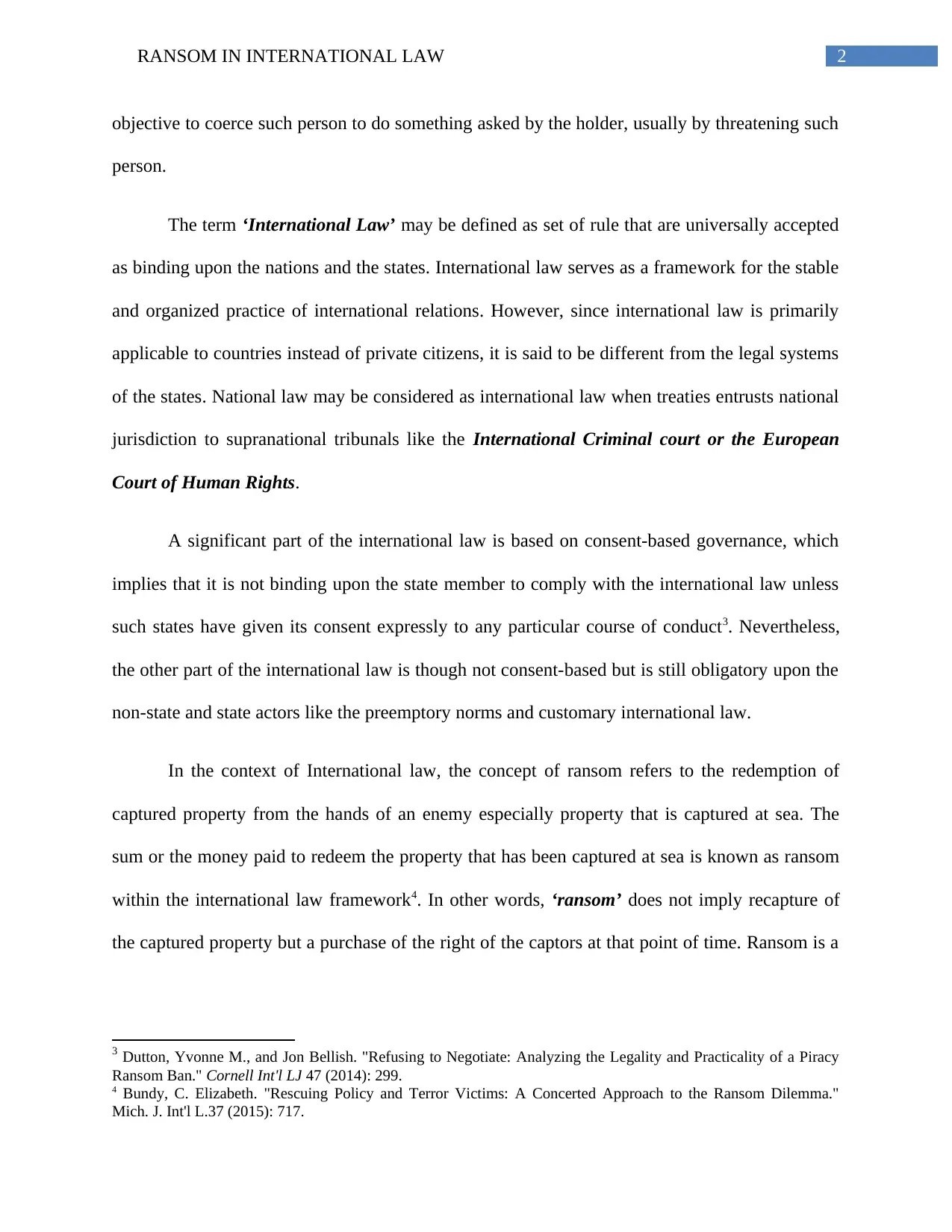
2RANSOM IN INTERNATIONAL LAW
objective to coerce such person to do something asked by the holder, usually by threatening such
person.
The term ‘International Law’ may be defined as set of rule that are universally accepted
as binding upon the nations and the states. International law serves as a framework for the stable
and organized practice of international relations. However, since international law is primarily
applicable to countries instead of private citizens, it is said to be different from the legal systems
of the states. National law may be considered as international law when treaties entrusts national
jurisdiction to supranational tribunals like the International Criminal court or the European
Court of Human Rights.
A significant part of the international law is based on consent-based governance, which
implies that it is not binding upon the state member to comply with the international law unless
such states have given its consent expressly to any particular course of conduct3. Nevertheless,
the other part of the international law is though not consent-based but is still obligatory upon the
non-state and state actors like the preemptory norms and customary international law.
In the context of International law, the concept of ransom refers to the redemption of
captured property from the hands of an enemy especially property that is captured at sea. The
sum or the money paid to redeem the property that has been captured at sea is known as ransom
within the international law framework4. In other words, ‘ransom’ does not imply recapture of
the captured property but a purchase of the right of the captors at that point of time. Ransom is a
3 Dutton, Yvonne M., and Jon Bellish. "Refusing to Negotiate: Analyzing the Legality and Practicality of a Piracy
Ransom Ban." Cornell Int'l LJ 47 (2014): 299.
4 Bundy, C. Elizabeth. "Rescuing Policy and Terror Victims: A Concerted Approach to the Ransom Dilemma."
Mich. J. Int'l L.37 (2015): 717.
objective to coerce such person to do something asked by the holder, usually by threatening such
person.
The term ‘International Law’ may be defined as set of rule that are universally accepted
as binding upon the nations and the states. International law serves as a framework for the stable
and organized practice of international relations. However, since international law is primarily
applicable to countries instead of private citizens, it is said to be different from the legal systems
of the states. National law may be considered as international law when treaties entrusts national
jurisdiction to supranational tribunals like the International Criminal court or the European
Court of Human Rights.
A significant part of the international law is based on consent-based governance, which
implies that it is not binding upon the state member to comply with the international law unless
such states have given its consent expressly to any particular course of conduct3. Nevertheless,
the other part of the international law is though not consent-based but is still obligatory upon the
non-state and state actors like the preemptory norms and customary international law.
In the context of International law, the concept of ransom refers to the redemption of
captured property from the hands of an enemy especially property that is captured at sea. The
sum or the money paid to redeem the property that has been captured at sea is known as ransom
within the international law framework4. In other words, ‘ransom’ does not imply recapture of
the captured property but a purchase of the right of the captors at that point of time. Ransom is a
3 Dutton, Yvonne M., and Jon Bellish. "Refusing to Negotiate: Analyzing the Legality and Practicality of a Piracy
Ransom Ban." Cornell Int'l LJ 47 (2014): 299.
4 Bundy, C. Elizabeth. "Rescuing Policy and Terror Victims: A Concerted Approach to the Ransom Dilemma."
Mich. J. Int'l L.37 (2015): 717.
⊘ This is a preview!⊘
Do you want full access?
Subscribe today to unlock all pages.

Trusted by 1+ million students worldwide
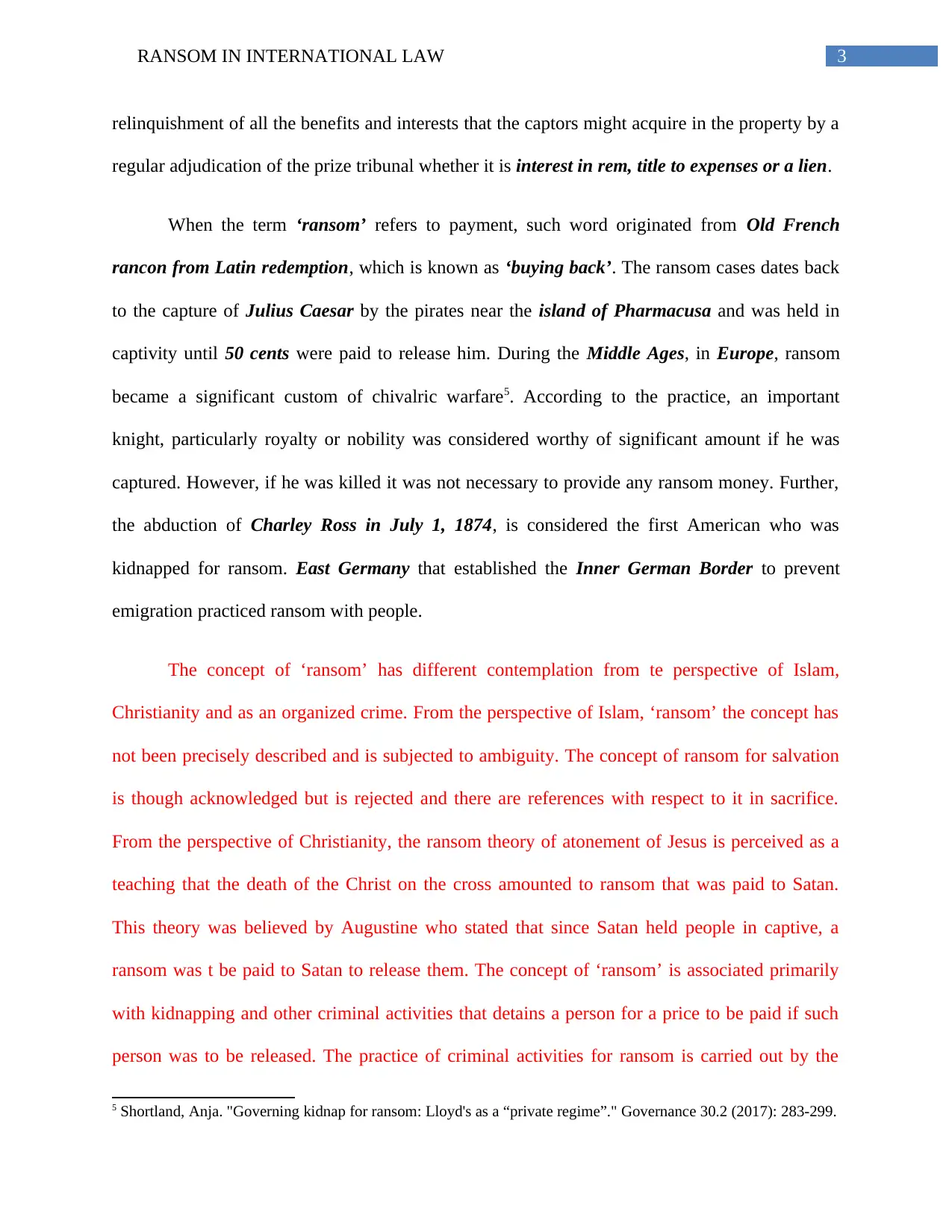
3RANSOM IN INTERNATIONAL LAW
relinquishment of all the benefits and interests that the captors might acquire in the property by a
regular adjudication of the prize tribunal whether it is interest in rem, title to expenses or a lien.
When the term ‘ransom’ refers to payment, such word originated from Old French
rancon from Latin redemption, which is known as ‘buying back’. The ransom cases dates back
to the capture of Julius Caesar by the pirates near the island of Pharmacusa and was held in
captivity until 50 cents were paid to release him. During the Middle Ages, in Europe, ransom
became a significant custom of chivalric warfare5. According to the practice, an important
knight, particularly royalty or nobility was considered worthy of significant amount if he was
captured. However, if he was killed it was not necessary to provide any ransom money. Further,
the abduction of Charley Ross in July 1, 1874, is considered the first American who was
kidnapped for ransom. East Germany that established the Inner German Border to prevent
emigration practiced ransom with people.
The concept of ‘ransom’ has different contemplation from te perspective of Islam,
Christianity and as an organized crime. From the perspective of Islam, ‘ransom’ the concept has
not been precisely described and is subjected to ambiguity. The concept of ransom for salvation
is though acknowledged but is rejected and there are references with respect to it in sacrifice.
From the perspective of Christianity, the ransom theory of atonement of Jesus is perceived as a
teaching that the death of the Christ on the cross amounted to ransom that was paid to Satan.
This theory was believed by Augustine who stated that since Satan held people in captive, a
ransom was t be paid to Satan to release them. The concept of ‘ransom’ is associated primarily
with kidnapping and other criminal activities that detains a person for a price to be paid if such
person was to be released. The practice of criminal activities for ransom is carried out by the
5 Shortland, Anja. "Governing kidnap for ransom: Lloyd's as a “private regime”." Governance 30.2 (2017): 283-299.
relinquishment of all the benefits and interests that the captors might acquire in the property by a
regular adjudication of the prize tribunal whether it is interest in rem, title to expenses or a lien.
When the term ‘ransom’ refers to payment, such word originated from Old French
rancon from Latin redemption, which is known as ‘buying back’. The ransom cases dates back
to the capture of Julius Caesar by the pirates near the island of Pharmacusa and was held in
captivity until 50 cents were paid to release him. During the Middle Ages, in Europe, ransom
became a significant custom of chivalric warfare5. According to the practice, an important
knight, particularly royalty or nobility was considered worthy of significant amount if he was
captured. However, if he was killed it was not necessary to provide any ransom money. Further,
the abduction of Charley Ross in July 1, 1874, is considered the first American who was
kidnapped for ransom. East Germany that established the Inner German Border to prevent
emigration practiced ransom with people.
The concept of ‘ransom’ has different contemplation from te perspective of Islam,
Christianity and as an organized crime. From the perspective of Islam, ‘ransom’ the concept has
not been precisely described and is subjected to ambiguity. The concept of ransom for salvation
is though acknowledged but is rejected and there are references with respect to it in sacrifice.
From the perspective of Christianity, the ransom theory of atonement of Jesus is perceived as a
teaching that the death of the Christ on the cross amounted to ransom that was paid to Satan.
This theory was believed by Augustine who stated that since Satan held people in captive, a
ransom was t be paid to Satan to release them. The concept of ‘ransom’ is associated primarily
with kidnapping and other criminal activities that detains a person for a price to be paid if such
person was to be released. The practice of criminal activities for ransom is carried out by the
5 Shortland, Anja. "Governing kidnap for ransom: Lloyd's as a “private regime”." Governance 30.2 (2017): 283-299.
Paraphrase This Document
Need a fresh take? Get an instant paraphrase of this document with our AI Paraphraser
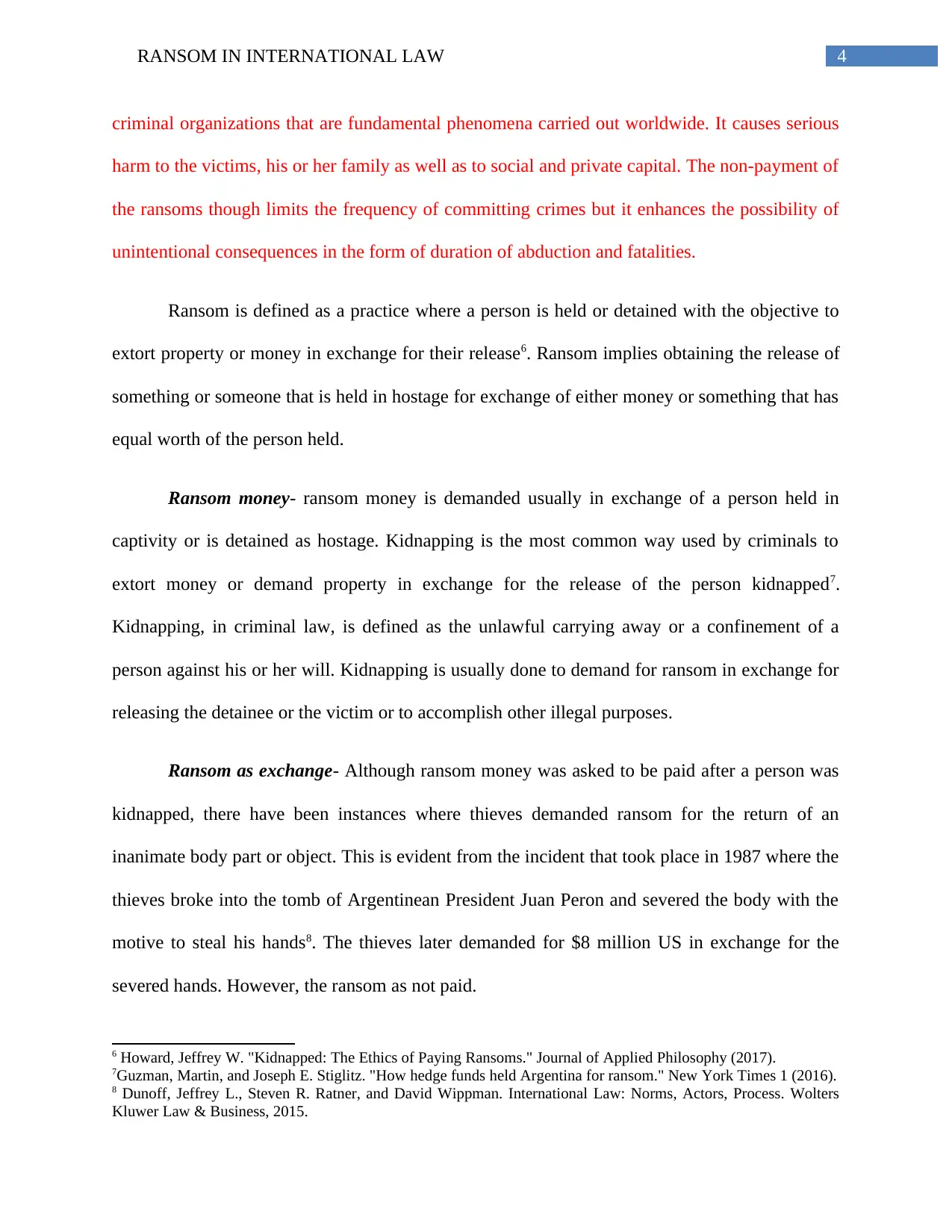
4RANSOM IN INTERNATIONAL LAW
criminal organizations that are fundamental phenomena carried out worldwide. It causes serious
harm to the victims, his or her family as well as to social and private capital. The non-payment of
the ransoms though limits the frequency of committing crimes but it enhances the possibility of
unintentional consequences in the form of duration of abduction and fatalities.
Ransom is defined as a practice where a person is held or detained with the objective to
extort property or money in exchange for their release6. Ransom implies obtaining the release of
something or someone that is held in hostage for exchange of either money or something that has
equal worth of the person held.
Ransom money- ransom money is demanded usually in exchange of a person held in
captivity or is detained as hostage. Kidnapping is the most common way used by criminals to
extort money or demand property in exchange for the release of the person kidnapped7.
Kidnapping, in criminal law, is defined as the unlawful carrying away or a confinement of a
person against his or her will. Kidnapping is usually done to demand for ransom in exchange for
releasing the detainee or the victim or to accomplish other illegal purposes.
Ransom as exchange- Although ransom money was asked to be paid after a person was
kidnapped, there have been instances where thieves demanded ransom for the return of an
inanimate body part or object. This is evident from the incident that took place in 1987 where the
thieves broke into the tomb of Argentinean President Juan Peron and severed the body with the
motive to steal his hands8. The thieves later demanded for $8 million US in exchange for the
severed hands. However, the ransom as not paid.
6 Howard, Jeffrey W. "Kidnapped: The Ethics of Paying Ransoms." Journal of Applied Philosophy (2017).
7Guzman, Martin, and Joseph E. Stiglitz. "How hedge funds held Argentina for ransom." New York Times 1 (2016).
8 Dunoff, Jeffrey L., Steven R. Ratner, and David Wippman. International Law: Norms, Actors, Process. Wolters
Kluwer Law & Business, 2015.
criminal organizations that are fundamental phenomena carried out worldwide. It causes serious
harm to the victims, his or her family as well as to social and private capital. The non-payment of
the ransoms though limits the frequency of committing crimes but it enhances the possibility of
unintentional consequences in the form of duration of abduction and fatalities.
Ransom is defined as a practice where a person is held or detained with the objective to
extort property or money in exchange for their release6. Ransom implies obtaining the release of
something or someone that is held in hostage for exchange of either money or something that has
equal worth of the person held.
Ransom money- ransom money is demanded usually in exchange of a person held in
captivity or is detained as hostage. Kidnapping is the most common way used by criminals to
extort money or demand property in exchange for the release of the person kidnapped7.
Kidnapping, in criminal law, is defined as the unlawful carrying away or a confinement of a
person against his or her will. Kidnapping is usually done to demand for ransom in exchange for
releasing the detainee or the victim or to accomplish other illegal purposes.
Ransom as exchange- Although ransom money was asked to be paid after a person was
kidnapped, there have been instances where thieves demanded ransom for the return of an
inanimate body part or object. This is evident from the incident that took place in 1987 where the
thieves broke into the tomb of Argentinean President Juan Peron and severed the body with the
motive to steal his hands8. The thieves later demanded for $8 million US in exchange for the
severed hands. However, the ransom as not paid.
6 Howard, Jeffrey W. "Kidnapped: The Ethics of Paying Ransoms." Journal of Applied Philosophy (2017).
7Guzman, Martin, and Joseph E. Stiglitz. "How hedge funds held Argentina for ransom." New York Times 1 (2016).
8 Dunoff, Jeffrey L., Steven R. Ratner, and David Wippman. International Law: Norms, Actors, Process. Wolters
Kluwer Law & Business, 2015.
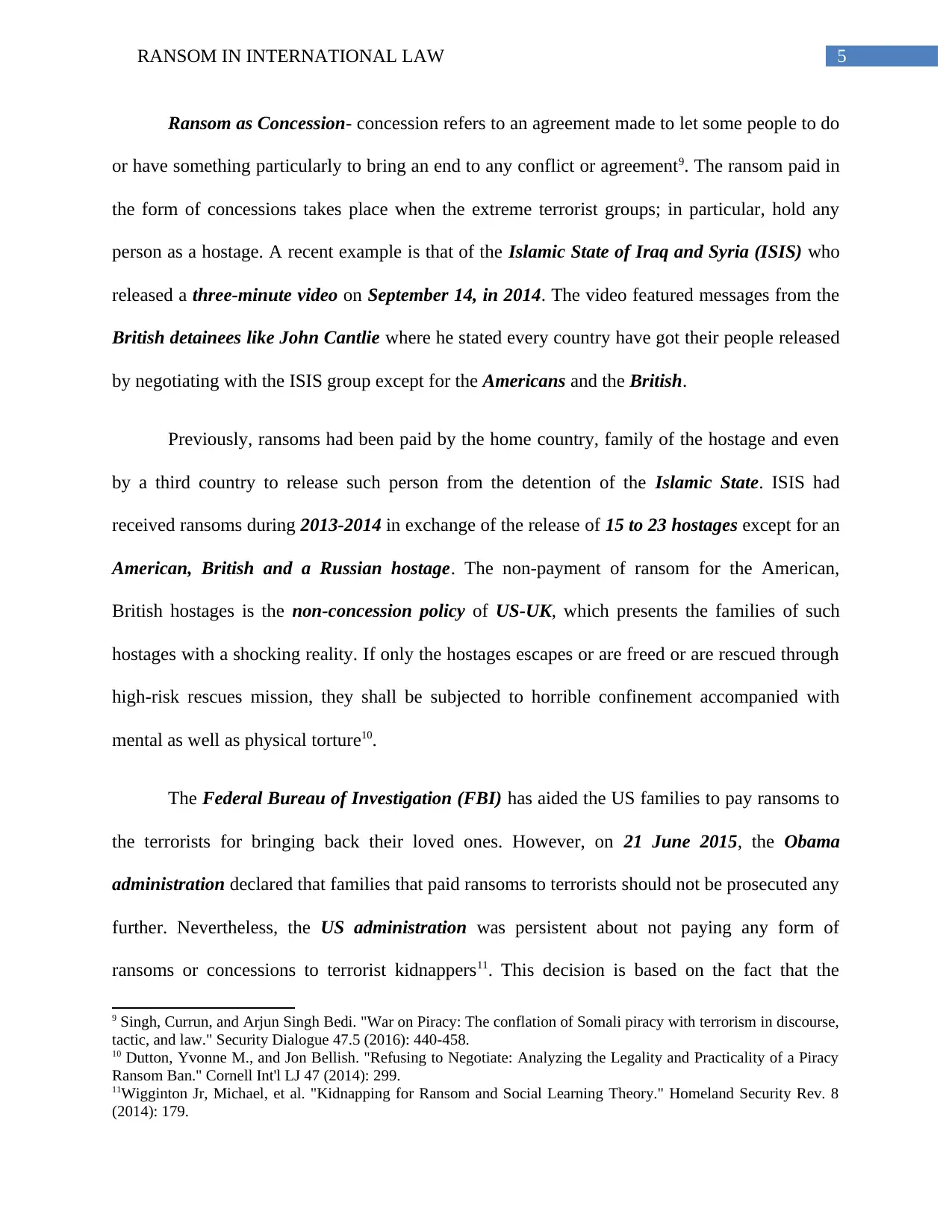
5RANSOM IN INTERNATIONAL LAW
Ransom as Concession- concession refers to an agreement made to let some people to do
or have something particularly to bring an end to any conflict or agreement9. The ransom paid in
the form of concessions takes place when the extreme terrorist groups; in particular, hold any
person as a hostage. A recent example is that of the Islamic State of Iraq and Syria (ISIS) who
released a three-minute video on September 14, in 2014. The video featured messages from the
British detainees like John Cantlie where he stated every country have got their people released
by negotiating with the ISIS group except for the Americans and the British.
Previously, ransoms had been paid by the home country, family of the hostage and even
by a third country to release such person from the detention of the Islamic State. ISIS had
received ransoms during 2013-2014 in exchange of the release of 15 to 23 hostages except for an
American, British and a Russian hostage. The non-payment of ransom for the American,
British hostages is the non-concession policy of US-UK, which presents the families of such
hostages with a shocking reality. If only the hostages escapes or are freed or are rescued through
high-risk rescues mission, they shall be subjected to horrible confinement accompanied with
mental as well as physical torture10.
The Federal Bureau of Investigation (FBI) has aided the US families to pay ransoms to
the terrorists for bringing back their loved ones. However, on 21 June 2015, the Obama
administration declared that families that paid ransoms to terrorists should not be prosecuted any
further. Nevertheless, the US administration was persistent about not paying any form of
ransoms or concessions to terrorist kidnappers11. This decision is based on the fact that the
9 Singh, Currun, and Arjun Singh Bedi. "War on Piracy: The conflation of Somali piracy with terrorism in discourse,
tactic, and law." Security Dialogue 47.5 (2016): 440-458.
10 Dutton, Yvonne M., and Jon Bellish. "Refusing to Negotiate: Analyzing the Legality and Practicality of a Piracy
Ransom Ban." Cornell Int'l LJ 47 (2014): 299.
11Wigginton Jr, Michael, et al. "Kidnapping for Ransom and Social Learning Theory." Homeland Security Rev. 8
(2014): 179.
Ransom as Concession- concession refers to an agreement made to let some people to do
or have something particularly to bring an end to any conflict or agreement9. The ransom paid in
the form of concessions takes place when the extreme terrorist groups; in particular, hold any
person as a hostage. A recent example is that of the Islamic State of Iraq and Syria (ISIS) who
released a three-minute video on September 14, in 2014. The video featured messages from the
British detainees like John Cantlie where he stated every country have got their people released
by negotiating with the ISIS group except for the Americans and the British.
Previously, ransoms had been paid by the home country, family of the hostage and even
by a third country to release such person from the detention of the Islamic State. ISIS had
received ransoms during 2013-2014 in exchange of the release of 15 to 23 hostages except for an
American, British and a Russian hostage. The non-payment of ransom for the American,
British hostages is the non-concession policy of US-UK, which presents the families of such
hostages with a shocking reality. If only the hostages escapes or are freed or are rescued through
high-risk rescues mission, they shall be subjected to horrible confinement accompanied with
mental as well as physical torture10.
The Federal Bureau of Investigation (FBI) has aided the US families to pay ransoms to
the terrorists for bringing back their loved ones. However, on 21 June 2015, the Obama
administration declared that families that paid ransoms to terrorists should not be prosecuted any
further. Nevertheless, the US administration was persistent about not paying any form of
ransoms or concessions to terrorist kidnappers11. This decision is based on the fact that the
9 Singh, Currun, and Arjun Singh Bedi. "War on Piracy: The conflation of Somali piracy with terrorism in discourse,
tactic, and law." Security Dialogue 47.5 (2016): 440-458.
10 Dutton, Yvonne M., and Jon Bellish. "Refusing to Negotiate: Analyzing the Legality and Practicality of a Piracy
Ransom Ban." Cornell Int'l LJ 47 (2014): 299.
11Wigginton Jr, Michael, et al. "Kidnapping for Ransom and Social Learning Theory." Homeland Security Rev. 8
(2014): 179.
⊘ This is a preview!⊘
Do you want full access?
Subscribe today to unlock all pages.

Trusted by 1+ million students worldwide
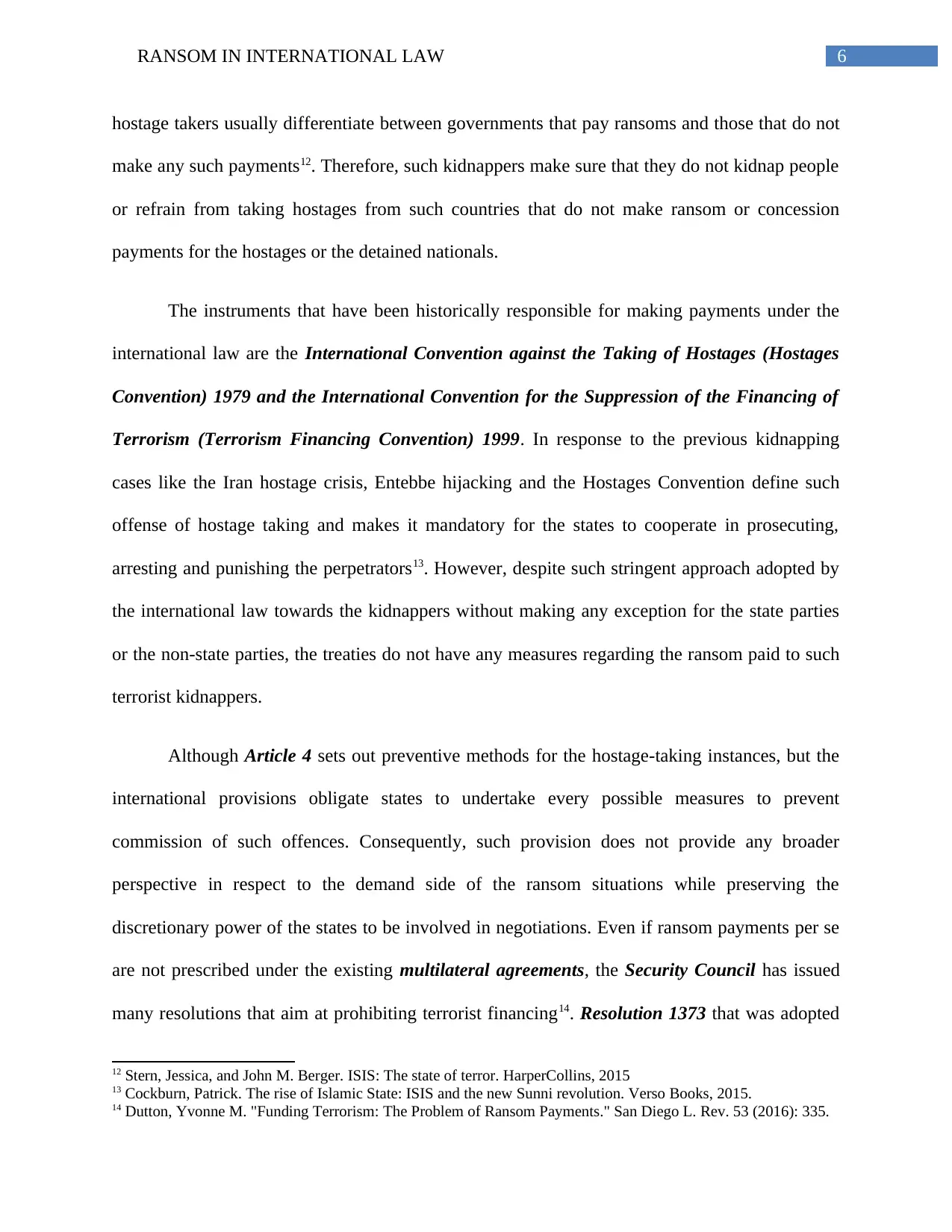
6RANSOM IN INTERNATIONAL LAW
hostage takers usually differentiate between governments that pay ransoms and those that do not
make any such payments12. Therefore, such kidnappers make sure that they do not kidnap people
or refrain from taking hostages from such countries that do not make ransom or concession
payments for the hostages or the detained nationals.
The instruments that have been historically responsible for making payments under the
international law are the International Convention against the Taking of Hostages (Hostages
Convention) 1979 and the International Convention for the Suppression of the Financing of
Terrorism (Terrorism Financing Convention) 1999. In response to the previous kidnapping
cases like the Iran hostage crisis, Entebbe hijacking and the Hostages Convention define such
offense of hostage taking and makes it mandatory for the states to cooperate in prosecuting,
arresting and punishing the perpetrators13. However, despite such stringent approach adopted by
the international law towards the kidnappers without making any exception for the state parties
or the non-state parties, the treaties do not have any measures regarding the ransom paid to such
terrorist kidnappers.
Although Article 4 sets out preventive methods for the hostage-taking instances, but the
international provisions obligate states to undertake every possible measures to prevent
commission of such offences. Consequently, such provision does not provide any broader
perspective in respect to the demand side of the ransom situations while preserving the
discretionary power of the states to be involved in negotiations. Even if ransom payments per se
are not prescribed under the existing multilateral agreements, the Security Council has issued
many resolutions that aim at prohibiting terrorist financing14. Resolution 1373 that was adopted
12 Stern, Jessica, and John M. Berger. ISIS: The state of terror. HarperCollins, 2015
13 Cockburn, Patrick. The rise of Islamic State: ISIS and the new Sunni revolution. Verso Books, 2015.
14 Dutton, Yvonne M. "Funding Terrorism: The Problem of Ransom Payments." San Diego L. Rev. 53 (2016): 335.
hostage takers usually differentiate between governments that pay ransoms and those that do not
make any such payments12. Therefore, such kidnappers make sure that they do not kidnap people
or refrain from taking hostages from such countries that do not make ransom or concession
payments for the hostages or the detained nationals.
The instruments that have been historically responsible for making payments under the
international law are the International Convention against the Taking of Hostages (Hostages
Convention) 1979 and the International Convention for the Suppression of the Financing of
Terrorism (Terrorism Financing Convention) 1999. In response to the previous kidnapping
cases like the Iran hostage crisis, Entebbe hijacking and the Hostages Convention define such
offense of hostage taking and makes it mandatory for the states to cooperate in prosecuting,
arresting and punishing the perpetrators13. However, despite such stringent approach adopted by
the international law towards the kidnappers without making any exception for the state parties
or the non-state parties, the treaties do not have any measures regarding the ransom paid to such
terrorist kidnappers.
Although Article 4 sets out preventive methods for the hostage-taking instances, but the
international provisions obligate states to undertake every possible measures to prevent
commission of such offences. Consequently, such provision does not provide any broader
perspective in respect to the demand side of the ransom situations while preserving the
discretionary power of the states to be involved in negotiations. Even if ransom payments per se
are not prescribed under the existing multilateral agreements, the Security Council has issued
many resolutions that aim at prohibiting terrorist financing14. Resolution 1373 that was adopted
12 Stern, Jessica, and John M. Berger. ISIS: The state of terror. HarperCollins, 2015
13 Cockburn, Patrick. The rise of Islamic State: ISIS and the new Sunni revolution. Verso Books, 2015.
14 Dutton, Yvonne M. "Funding Terrorism: The Problem of Ransom Payments." San Diego L. Rev. 53 (2016): 335.
Paraphrase This Document
Need a fresh take? Get an instant paraphrase of this document with our AI Paraphraser
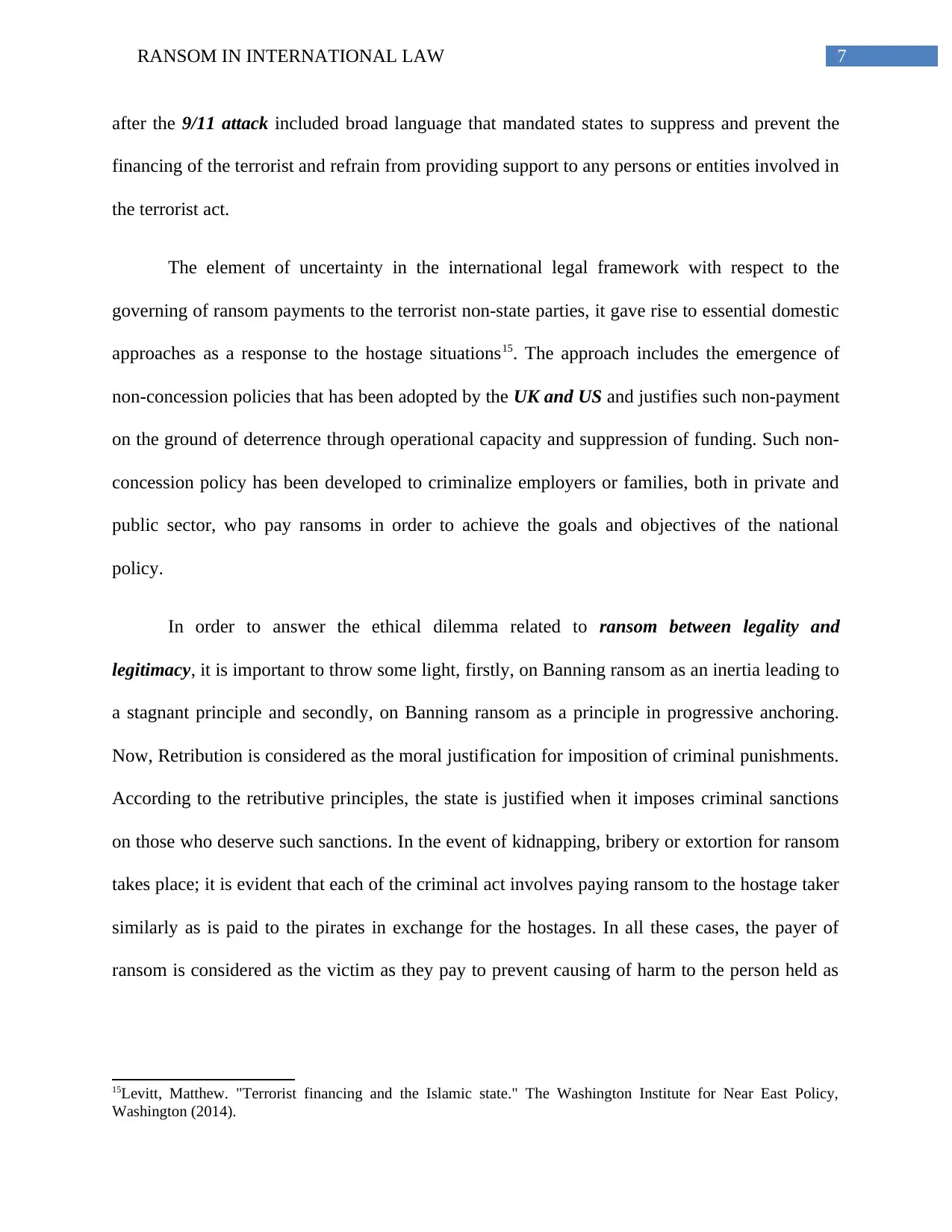
7RANSOM IN INTERNATIONAL LAW
after the 9/11 attack included broad language that mandated states to suppress and prevent the
financing of the terrorist and refrain from providing support to any persons or entities involved in
the terrorist act.
The element of uncertainty in the international legal framework with respect to the
governing of ransom payments to the terrorist non-state parties, it gave rise to essential domestic
approaches as a response to the hostage situations15. The approach includes the emergence of
non-concession policies that has been adopted by the UK and US and justifies such non-payment
on the ground of deterrence through operational capacity and suppression of funding. Such non-
concession policy has been developed to criminalize employers or families, both in private and
public sector, who pay ransoms in order to achieve the goals and objectives of the national
policy.
In order to answer the ethical dilemma related to ransom between legality and
legitimacy, it is important to throw some light, firstly, on Banning ransom as an inertia leading to
a stagnant principle and secondly, on Banning ransom as a principle in progressive anchoring.
Now, Retribution is considered as the moral justification for imposition of criminal punishments.
According to the retributive principles, the state is justified when it imposes criminal sanctions
on those who deserve such sanctions. In the event of kidnapping, bribery or extortion for ransom
takes place; it is evident that each of the criminal act involves paying ransom to the hostage taker
similarly as is paid to the pirates in exchange for the hostages. In all these cases, the payer of
ransom is considered as the victim as they pay to prevent causing of harm to the person held as
15Levitt, Matthew. "Terrorist financing and the Islamic state." The Washington Institute for Near East Policy,
Washington (2014).
after the 9/11 attack included broad language that mandated states to suppress and prevent the
financing of the terrorist and refrain from providing support to any persons or entities involved in
the terrorist act.
The element of uncertainty in the international legal framework with respect to the
governing of ransom payments to the terrorist non-state parties, it gave rise to essential domestic
approaches as a response to the hostage situations15. The approach includes the emergence of
non-concession policies that has been adopted by the UK and US and justifies such non-payment
on the ground of deterrence through operational capacity and suppression of funding. Such non-
concession policy has been developed to criminalize employers or families, both in private and
public sector, who pay ransoms in order to achieve the goals and objectives of the national
policy.
In order to answer the ethical dilemma related to ransom between legality and
legitimacy, it is important to throw some light, firstly, on Banning ransom as an inertia leading to
a stagnant principle and secondly, on Banning ransom as a principle in progressive anchoring.
Now, Retribution is considered as the moral justification for imposition of criminal punishments.
According to the retributive principles, the state is justified when it imposes criminal sanctions
on those who deserve such sanctions. In the event of kidnapping, bribery or extortion for ransom
takes place; it is evident that each of the criminal act involves paying ransom to the hostage taker
similarly as is paid to the pirates in exchange for the hostages. In all these cases, the payer of
ransom is considered as the victim as they pay to prevent causing of harm to the person held as
15Levitt, Matthew. "Terrorist financing and the Islamic state." The Washington Institute for Near East Policy,
Washington (2014).
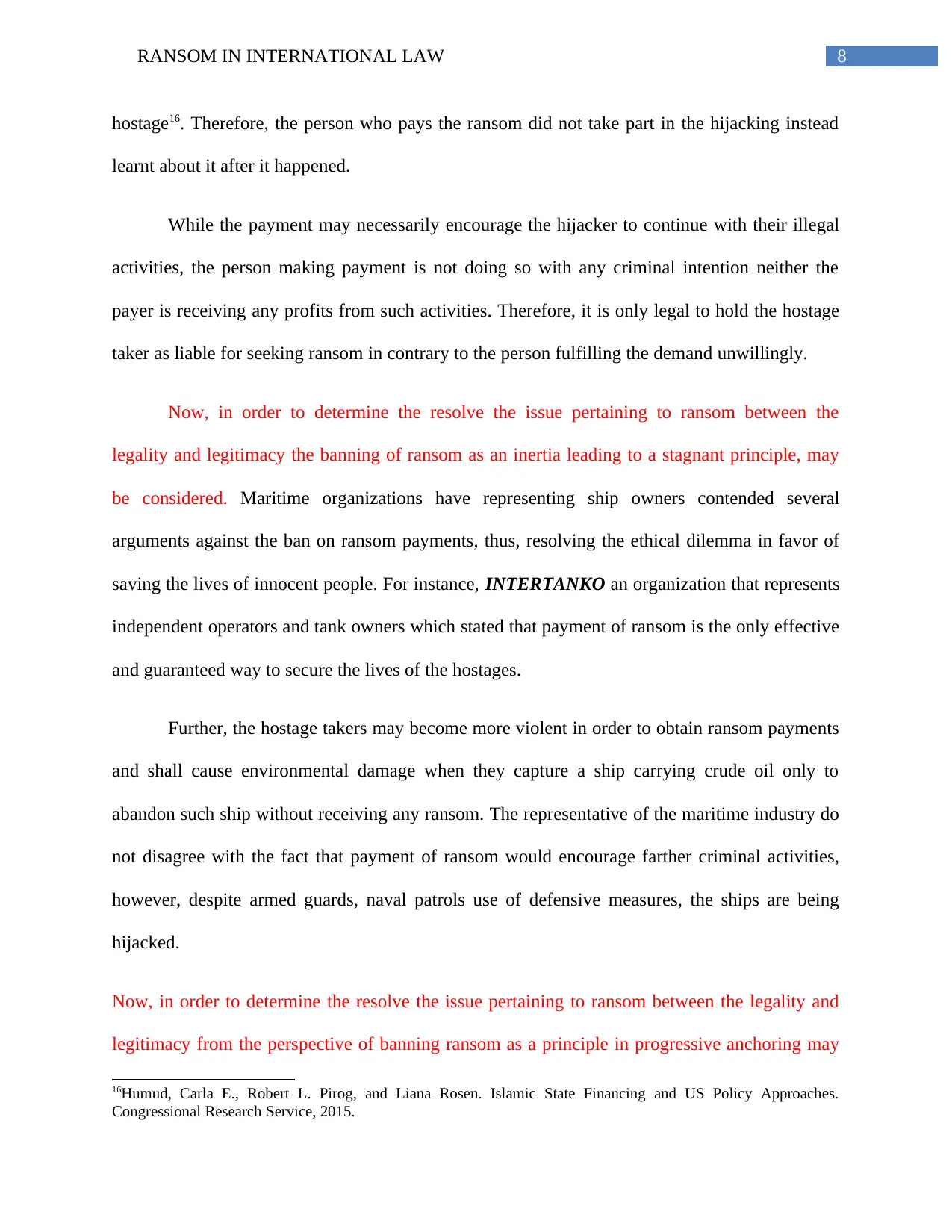
8RANSOM IN INTERNATIONAL LAW
hostage16. Therefore, the person who pays the ransom did not take part in the hijacking instead
learnt about it after it happened.
While the payment may necessarily encourage the hijacker to continue with their illegal
activities, the person making payment is not doing so with any criminal intention neither the
payer is receiving any profits from such activities. Therefore, it is only legal to hold the hostage
taker as liable for seeking ransom in contrary to the person fulfilling the demand unwillingly.
Now, in order to determine the resolve the issue pertaining to ransom between the
legality and legitimacy the banning of ransom as an inertia leading to a stagnant principle, may
be considered. Maritime organizations have representing ship owners contended several
arguments against the ban on ransom payments, thus, resolving the ethical dilemma in favor of
saving the lives of innocent people. For instance, INTERTANKO an organization that represents
independent operators and tank owners which stated that payment of ransom is the only effective
and guaranteed way to secure the lives of the hostages.
Further, the hostage takers may become more violent in order to obtain ransom payments
and shall cause environmental damage when they capture a ship carrying crude oil only to
abandon such ship without receiving any ransom. The representative of the maritime industry do
not disagree with the fact that payment of ransom would encourage farther criminal activities,
however, despite armed guards, naval patrols use of defensive measures, the ships are being
hijacked.
Now, in order to determine the resolve the issue pertaining to ransom between the legality and
legitimacy from the perspective of banning ransom as a principle in progressive anchoring may
16Humud, Carla E., Robert L. Pirog, and Liana Rosen. Islamic State Financing and US Policy Approaches.
Congressional Research Service, 2015.
hostage16. Therefore, the person who pays the ransom did not take part in the hijacking instead
learnt about it after it happened.
While the payment may necessarily encourage the hijacker to continue with their illegal
activities, the person making payment is not doing so with any criminal intention neither the
payer is receiving any profits from such activities. Therefore, it is only legal to hold the hostage
taker as liable for seeking ransom in contrary to the person fulfilling the demand unwillingly.
Now, in order to determine the resolve the issue pertaining to ransom between the
legality and legitimacy the banning of ransom as an inertia leading to a stagnant principle, may
be considered. Maritime organizations have representing ship owners contended several
arguments against the ban on ransom payments, thus, resolving the ethical dilemma in favor of
saving the lives of innocent people. For instance, INTERTANKO an organization that represents
independent operators and tank owners which stated that payment of ransom is the only effective
and guaranteed way to secure the lives of the hostages.
Further, the hostage takers may become more violent in order to obtain ransom payments
and shall cause environmental damage when they capture a ship carrying crude oil only to
abandon such ship without receiving any ransom. The representative of the maritime industry do
not disagree with the fact that payment of ransom would encourage farther criminal activities,
however, despite armed guards, naval patrols use of defensive measures, the ships are being
hijacked.
Now, in order to determine the resolve the issue pertaining to ransom between the legality and
legitimacy from the perspective of banning ransom as a principle in progressive anchoring may
16Humud, Carla E., Robert L. Pirog, and Liana Rosen. Islamic State Financing and US Policy Approaches.
Congressional Research Service, 2015.
⊘ This is a preview!⊘
Do you want full access?
Subscribe today to unlock all pages.

Trusted by 1+ million students worldwide
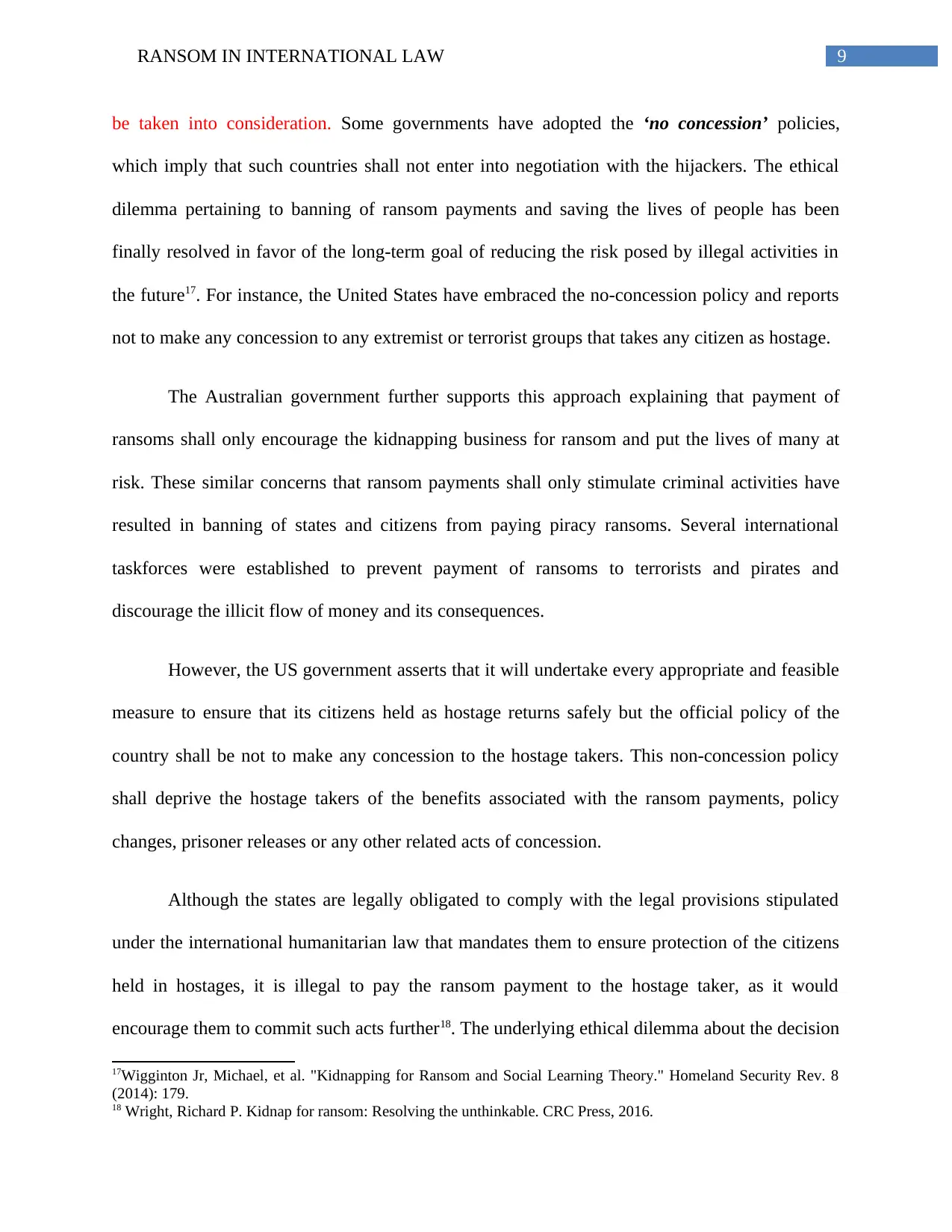
9RANSOM IN INTERNATIONAL LAW
be taken into consideration. Some governments have adopted the ‘no concession’ policies,
which imply that such countries shall not enter into negotiation with the hijackers. The ethical
dilemma pertaining to banning of ransom payments and saving the lives of people has been
finally resolved in favor of the long-term goal of reducing the risk posed by illegal activities in
the future17. For instance, the United States have embraced the no-concession policy and reports
not to make any concession to any extremist or terrorist groups that takes any citizen as hostage.
The Australian government further supports this approach explaining that payment of
ransoms shall only encourage the kidnapping business for ransom and put the lives of many at
risk. These similar concerns that ransom payments shall only stimulate criminal activities have
resulted in banning of states and citizens from paying piracy ransoms. Several international
taskforces were established to prevent payment of ransoms to terrorists and pirates and
discourage the illicit flow of money and its consequences.
However, the US government asserts that it will undertake every appropriate and feasible
measure to ensure that its citizens held as hostage returns safely but the official policy of the
country shall be not to make any concession to the hostage takers. This non-concession policy
shall deprive the hostage takers of the benefits associated with the ransom payments, policy
changes, prisoner releases or any other related acts of concession.
Although the states are legally obligated to comply with the legal provisions stipulated
under the international humanitarian law that mandates them to ensure protection of the citizens
held in hostages, it is illegal to pay the ransom payment to the hostage taker, as it would
encourage them to commit such acts further18. The underlying ethical dilemma about the decision
17Wigginton Jr, Michael, et al. "Kidnapping for Ransom and Social Learning Theory." Homeland Security Rev. 8
(2014): 179.
18 Wright, Richard P. Kidnap for ransom: Resolving the unthinkable. CRC Press, 2016.
be taken into consideration. Some governments have adopted the ‘no concession’ policies,
which imply that such countries shall not enter into negotiation with the hijackers. The ethical
dilemma pertaining to banning of ransom payments and saving the lives of people has been
finally resolved in favor of the long-term goal of reducing the risk posed by illegal activities in
the future17. For instance, the United States have embraced the no-concession policy and reports
not to make any concession to any extremist or terrorist groups that takes any citizen as hostage.
The Australian government further supports this approach explaining that payment of
ransoms shall only encourage the kidnapping business for ransom and put the lives of many at
risk. These similar concerns that ransom payments shall only stimulate criminal activities have
resulted in banning of states and citizens from paying piracy ransoms. Several international
taskforces were established to prevent payment of ransoms to terrorists and pirates and
discourage the illicit flow of money and its consequences.
However, the US government asserts that it will undertake every appropriate and feasible
measure to ensure that its citizens held as hostage returns safely but the official policy of the
country shall be not to make any concession to the hostage takers. This non-concession policy
shall deprive the hostage takers of the benefits associated with the ransom payments, policy
changes, prisoner releases or any other related acts of concession.
Although the states are legally obligated to comply with the legal provisions stipulated
under the international humanitarian law that mandates them to ensure protection of the citizens
held in hostages, it is illegal to pay the ransom payment to the hostage taker, as it would
encourage them to commit such acts further18. The underlying ethical dilemma about the decision
17Wigginton Jr, Michael, et al. "Kidnapping for Ransom and Social Learning Theory." Homeland Security Rev. 8
(2014): 179.
18 Wright, Richard P. Kidnap for ransom: Resolving the unthinkable. CRC Press, 2016.
Paraphrase This Document
Need a fresh take? Get an instant paraphrase of this document with our AI Paraphraser

10RANSOM IN INTERNATIONAL LAW
whether to sacrifice innocent lives or to ban ransom payments to achieve the enduring goal of
preventing future criminal activity is that payment of ransoms just stimulates the act of further
kidnapping operations.
whether to sacrifice innocent lives or to ban ransom payments to achieve the enduring goal of
preventing future criminal activity is that payment of ransoms just stimulates the act of further
kidnapping operations.
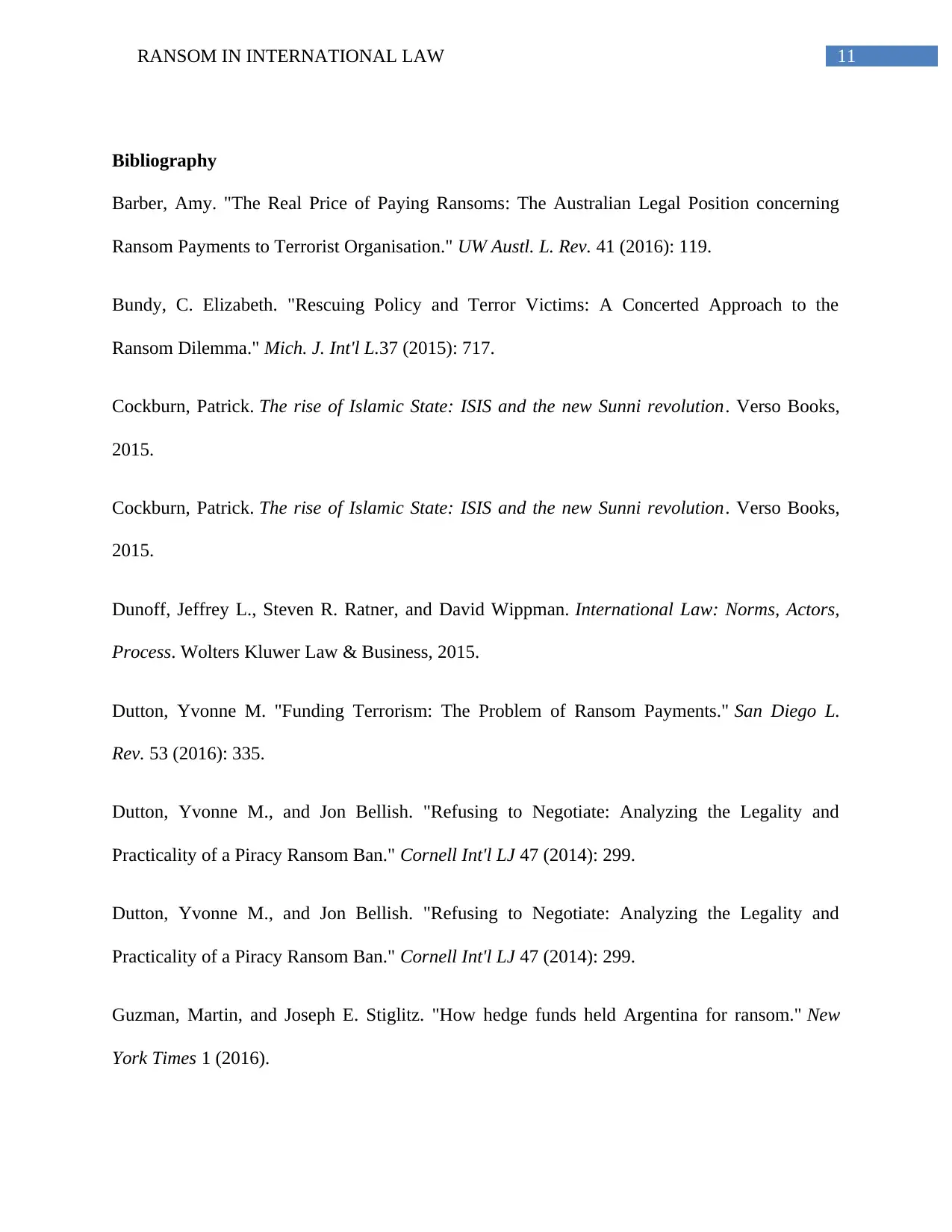
11RANSOM IN INTERNATIONAL LAW
Bibliography
Barber, Amy. "The Real Price of Paying Ransoms: The Australian Legal Position concerning
Ransom Payments to Terrorist Organisation." UW Austl. L. Rev. 41 (2016): 119.
Bundy, C. Elizabeth. "Rescuing Policy and Terror Victims: A Concerted Approach to the
Ransom Dilemma." Mich. J. Int'l L.37 (2015): 717.
Cockburn, Patrick. The rise of Islamic State: ISIS and the new Sunni revolution. Verso Books,
2015.
Cockburn, Patrick. The rise of Islamic State: ISIS and the new Sunni revolution. Verso Books,
2015.
Dunoff, Jeffrey L., Steven R. Ratner, and David Wippman. International Law: Norms, Actors,
Process. Wolters Kluwer Law & Business, 2015.
Dutton, Yvonne M. "Funding Terrorism: The Problem of Ransom Payments." San Diego L.
Rev. 53 (2016): 335.
Dutton, Yvonne M., and Jon Bellish. "Refusing to Negotiate: Analyzing the Legality and
Practicality of a Piracy Ransom Ban." Cornell Int'l LJ 47 (2014): 299.
Dutton, Yvonne M., and Jon Bellish. "Refusing to Negotiate: Analyzing the Legality and
Practicality of a Piracy Ransom Ban." Cornell Int'l LJ 47 (2014): 299.
Guzman, Martin, and Joseph E. Stiglitz. "How hedge funds held Argentina for ransom." New
York Times 1 (2016).
Bibliography
Barber, Amy. "The Real Price of Paying Ransoms: The Australian Legal Position concerning
Ransom Payments to Terrorist Organisation." UW Austl. L. Rev. 41 (2016): 119.
Bundy, C. Elizabeth. "Rescuing Policy and Terror Victims: A Concerted Approach to the
Ransom Dilemma." Mich. J. Int'l L.37 (2015): 717.
Cockburn, Patrick. The rise of Islamic State: ISIS and the new Sunni revolution. Verso Books,
2015.
Cockburn, Patrick. The rise of Islamic State: ISIS and the new Sunni revolution. Verso Books,
2015.
Dunoff, Jeffrey L., Steven R. Ratner, and David Wippman. International Law: Norms, Actors,
Process. Wolters Kluwer Law & Business, 2015.
Dutton, Yvonne M. "Funding Terrorism: The Problem of Ransom Payments." San Diego L.
Rev. 53 (2016): 335.
Dutton, Yvonne M., and Jon Bellish. "Refusing to Negotiate: Analyzing the Legality and
Practicality of a Piracy Ransom Ban." Cornell Int'l LJ 47 (2014): 299.
Dutton, Yvonne M., and Jon Bellish. "Refusing to Negotiate: Analyzing the Legality and
Practicality of a Piracy Ransom Ban." Cornell Int'l LJ 47 (2014): 299.
Guzman, Martin, and Joseph E. Stiglitz. "How hedge funds held Argentina for ransom." New
York Times 1 (2016).
⊘ This is a preview!⊘
Do you want full access?
Subscribe today to unlock all pages.

Trusted by 1+ million students worldwide
1 out of 14
Related Documents
Your All-in-One AI-Powered Toolkit for Academic Success.
+13062052269
info@desklib.com
Available 24*7 on WhatsApp / Email
![[object Object]](/_next/static/media/star-bottom.7253800d.svg)
Unlock your academic potential
Copyright © 2020–2025 A2Z Services. All Rights Reserved. Developed and managed by ZUCOL.





